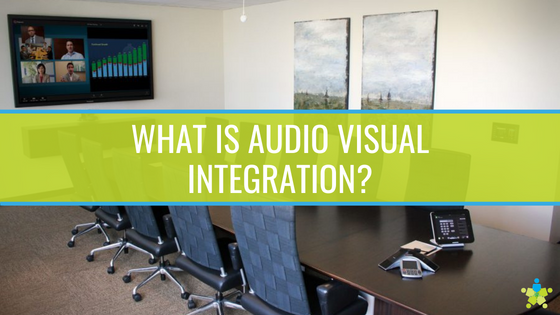[vc_row][vc_column][vc_column_text]AV integration is the process during which a certified AV expert designs, plans, installs and configures AV technology for client use. As AV systems can be scaled up or down almost endlessly, no two integration jobs are the same. A project that only involves setting up a few video conferencing bars, for example, is much simpler than overhauling a utility company's network control room.
But while the process may vary a bit from system to system, the idea behind integration goes beyond mere installation.[/vc_column_text][/vc_column][/vc_row][vc_row][vc_column][vc_column_text]
Why Is It Called Integration And Not Installation?
Because integration is much more than just installation. During simple installation services, it's typical for installers to consider the room the technology is going in and nothing else. There isn't a system-wide, much less a company-wide, view of how the new technology fits in. It isn't integrated into the organization's operations - it's only tacked on. When an experienced, certified professional provides AV integration services, they consider the needs of the client and look to connect those needs to the best AV tools available. While an installer may only be interested in selling hardware and getting it started, an integrator considers how to make AV work from your organization's perspective. In practice, AV integration comes with a higher level of service. It's like having an AV technology expert on your team.[/vc_column_text][vc_column_text]What's Included During The AV Integration Process?
The details may vary, but the following services are typically part of every integration project:- Consultation and initial planning - Before any actual AV tasks are completed, the integrator will first sit down with the client to discuss their AV needs. During this communication, the integrator can get the full picture on the organization's problems and goals. Using this information, the integrator can begin selecting technologies and solutions that will best fit the client's objectives.
- Site survey - During a site survey, the integrator will review the client's facilities to ensure it is ready for integration to proceed. During this survey, the integrator is looking for things that could interfere with the project, like outdated existing technologies or challenges with running cable.
- System design - If everything is a go for integration, the integrator's designers go to work visualizing the solution. During this step, the designer lays out the system according to the client's needs, along with the room's acoustics and size. The designer will also produce technical drawings for the client's reference.
- System installation - Once the solution has been designed, it's up to the installation team to place the hardware and run the cable. Occasionally, installers run into obstacles in the field, so they must be ready to produce workarounds and problem solve.
- Post-installation configuration and support - Following installation, there's still work to do in configuring the hardware for users and supporting the system's performance. Reputable integrators will offer options for long-term support, too. That way, all covered equipment can be maintained for optimal performance.
Who Is Qualified To Provide AV Integration Services?
As you can see, AV integration is no simple job. It takes a team of designers, technicians, project managers and support staff to see it from start to finish. Given the complexity involved, it's a good idea to target a certified AV integrator for your AV projects. Like many industries, the AV industry has prominent trade associations and manufacturers in place that can provide technicians with certifications. To attain certification, AV professionals must complete training and education, and prove their new-found knowledge during testing. There are a few reasons why it's important to factor in certification. For one, certified integrators remain up to date on their industry and product knowledge. Also, certified integrators may possess specialized knowledge in the vendors or products your organization is most interested in. Finally, certified integrators demonstrate a commitment to the industry, care about their reputation, and typically operate by a code of industry ethics and best practices.[/vc_column_text][vc_column_text]What Are Some Of The Most Important AV Certification Programs?
Clearly, certification is a must-have in any AV integrator you work with. But which certifications are the most valuable for industry professionals? If you're looking for an AV integrator, here are the certifications worth paying attention to:- AVIXA's CTS-I or CTS-D certification - The Audiovisual and Integrated Experience Association, or AVIXA, is the leading trade organization for the AV industry. As such, its certification programs are considered some of the most fundamental to AV success. AVIXA's Certified Technology Specialist (CTS) certification track is the most popular, and advanced CTS certification is split into design (CTS-D) and installation (CTS-I) tracks. CTS certification addresses every part of the integration process, preparing technicians for executing varying stages of integration and how to manage the job from start to finish.
- Certification through major vendors like Poly or Crestron - Prominent AV manufacturers include Crestron and Poly, both of which have operated in the industry for decades. Poly and Crestron products are some of the most popular for businesses, from SMBs to enterprise operations. Given their prevalence, it's common for AV technicians to seek certification in Poly or Crestron products. By doing so, AV professionals can remain knowledgeable of some of the most effective conferencing technology the industry has to offer.
- SBE's Certified Audio Engineer (CEA) - There are numerous certification options for technicians specializing in audio. In addition to major audio vendor certifications, like those from Shure or Biamp, there's also the Society of Broadcast Engineer's CEA certification. During CEA certification, technicians learn about audio theory, operating concepts, safety, and problem troubleshooting, ensuring they're ready to implement audio technology.



